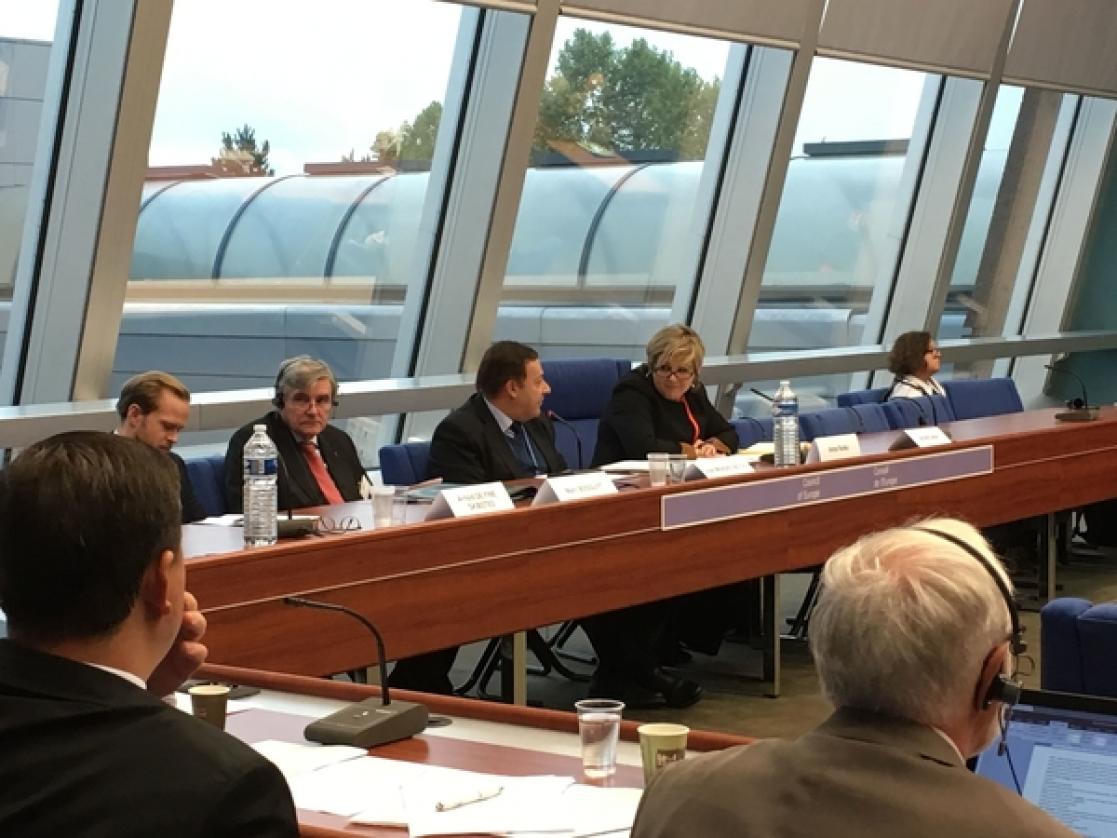Debate: "Return of the death penalty in Europe: Genuine threat or populist fiction?"

"Dear President of the Conference of INGO'S, Dear Anna Rurka,
Dear Commissioner Bossuyt,
Dear Thomas Sand Kirk, deputy to the Danish Permanent Representative
Ladies and gentleman,
I am glad to be here today with the Council of Europe to voice the EU and CoE common position against death penalty.
The objective of this event is to raise the visibility of our common action sensitizing political leaders and public opinion on the importance of abandoning capital punishment.
This message is as important today as ever. In many places around the world, the 10 October mobilizes strong voices against capital punishment.
In the EU Action Plan on Human Rights and Democracy, the fight against the death penalty is a prominent priority.
HRVP Mogherini, reaffirmed in a number of occasions the EU absolute opposition to capital punishment in all cases and without exception.
As referred to in our joint declaration with the CoE, the death penalty is a cruel and inhumane punishment, which fails to deter criminal behaviour and which represents a grave denial of human dignity and integrity.
The right to life is enshrined in the Universal Declaration of Human Rights proclaimed by the United Nations General Assembly on 10 December 1948 as a common standard of achievements for all peoples and all nations. Capital punishment violates the right to life and inflicts to the condemned a psychological torture.
An argument frequently used by the defenders of death penalty is its deterrent effect. The question of whether the death penalty is a more effective deterrent than long-term imprisonment has been debated for decades or longer by scholars, policy makers, and the general public.
A study, "Do Executions Lower Homicide Rates? The Views of Leading Criminologists", published in 2009, concluded that “There is overwhelming consensus among America’s top criminologists that the empirical research conducted on the deterrence question fails to support the threat or use of the death penalty.” A previous study in 1996 had come to similar conclusions.
A strong and unquestionable argument against the death penalty is its irreversibility. We all know that no justice system in the world is immune to mistakes. Errors are inevitable in any system including the most advanced ones. In the case of the death penalty, each error is a human life that is supressed, and in an irreversible way.
In many cases evidence was found after a death sentence was pronounced, proving the innocence of the condemned. Since 1973, in the US, more than 155 people have been released from death row with evidence of their innocence.[1]
Let me give an example amongst so many that could be cited. Teng Xingshan, a Chinese citizen, was executed for supposedly having raped, robbed and murdered Shi Xiaorong, a woman who had disappeared. An old man found a dismembered body, and police forensics claimed to have matched the body to the photo of the missing Shi Xiaorong.
The execution was carried out on 28 January 1989 by the Huaihua Intermediate People's Court. In 1993, the missing woman returned to the village, saying she had been kidnapped and taken to Shandong. The absolute innocence of the wrongfully executed Teng was afterwards admitted, but too late…
The number of proved justice miscarriages leading to the execution of innocent people is one of the strongest factor contributing to the decision of taken by many Countries to abolish the death penalty.
Indeed, a positive trend towards abolition and restriction of the use of capital punishment is evident in most countries over the last decades. More than two thirds of the world’s countries have already abolished the death penalty or stopped using it. Last year, only 23 countries have performed executions out of the ones that still retain the death penalty in active use.
But, despite a continuous positive trend over the last decades, there are still some worrying developments occurring. Where capital punishment remains in force, there are cases of serious violations of international norms and standards.
This includes the non-limitation of the death penalty to the most serious crimes, the non-exclusion of juvenile offenders from its scope, and the lack of guarantees of a fair trial.
At the same time, we have seen breaches on moratoria of executions by important partners and we have heard some countries that have abolished the death penalty talking about reintroducing it.
The EU actively participates in the initiatives leading to the UN General Assembly resolutions calling on all States that still maintain the death penalty to:
- Respect international standards that provide safeguards guaranteeing the protection of the right of those facing the death penalty, in particular minimum standards;
- Progressively restrict the use of death penalty and reduce the number of offences for which it may be imposed;
- Establish a moratorium on executions with a view to completely abolishing the death penalty.
Marking the World and European day against death penalty, we continue raising awareness on the need to respect those minimum recognized standards and to call on states which have abolished the death penalty to preserve it.

Dear friends,
I would like to finalize my intervention remembering two important forthcoming events. As another sign of its strong commitment against the death penalty, the EU and Belgium agreed to co-host the 7th World Congress against the Death Penalty, in Brussels from 27 February to 1 March 2019.
This commitment also includes the Regional Congress, which will take place in Ivory Coast, in April 2018. The World Congress is a major triennial event drawing together approximately 1500 participants from around the world, including some on very high level. The 6th World Congress took place in Oslo in 2016.
Finally, I wish to congratulate you, Anna Rurka, for the co-organisation of this event. The level of attendance and the level of the speakers are a self-evidence of the importance and actuality of debating here, and now, the abolition of the death penalty.
Thank you all for your attention."
[1] Death Penalty Information Center – Facts about the Death Penalty – updated September 25, 2017
